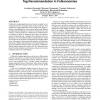Free Online Productivity Tools
i2Speak
i2Symbol
i2OCR
iTex2Img
iWeb2Print
iWeb2Shot
i2Type
iPdf2Split
iPdf2Merge
i2Bopomofo
i2Arabic
i2Style
i2Image
i2PDF
iLatex2Rtf
Sci2ools
RECSYS
2009
ACM
2009
ACM
The impact of ambiguity and redundancy on tag recommendation in folksonomies
Collaborative tagging applications have become a popular tool allowing Internet users to manage online resources with tags. Most collaborative tagging applications permit unsupervised tagging resulting in tag ambiguity in which a single tag has many different meanings and tag redundancy in which several tags have the same meaning. Common metrics for evaluating tag recommenders may overestimate the utility of ambiguous tags or ignore the appropriateness of redundant tags. Ambiguity and redundancy may even burden the user with additional effort by requiring them to clarify an annotation or forcing them to distinguish between highly related items. In this paper we demonstrate that ambiguity and redundancy impede the evaluation and performance of tag recommenders. Five tag recommendation strategies based on popularity, collaborative filtering and link analysis are explored. We use a cluster-based approach to define ambiguity and redundancy and provide extensive evaluation on three real ...
| Added | 23 Jul 2010 |
| Updated | 23 Jul 2010 |
| Type | Conference |
| Year | 2009 |
| Where | RECSYS |
| Authors | Jonathan Gemmell, Maryam Ramezani, Thomas Schimoler, Laura Christiansen, Bamshad Mobasher |
Comments (0)

